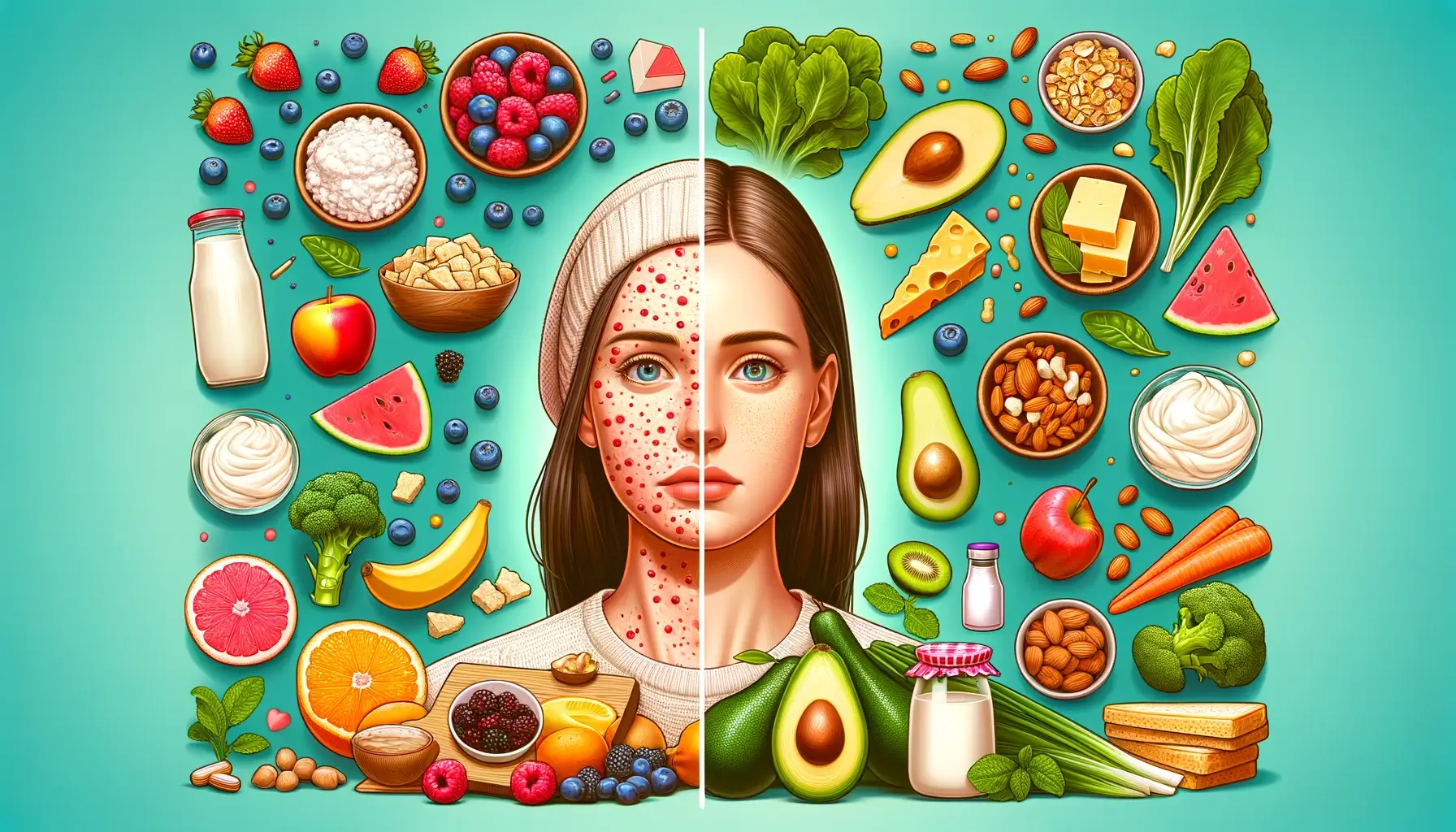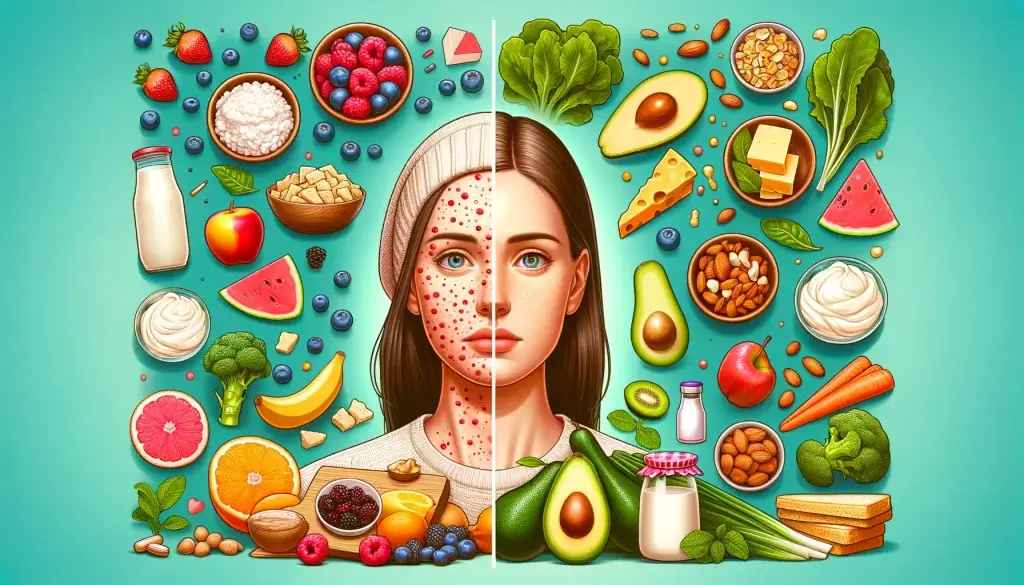Over the years, researchers have investigated into the intricate relationship between what we eat and the health of our skin. Studies have shown that certain foods can have a significant impact on the development and severity of acne. From high-glycemic foods to dairy products, the link between diet and skin health is becoming increasingly clear. In this blog post, we will explore the latest findings on the connection between diet and acne, shedding light on how our food choices can play a pivotal role in the appearance of our skin.
Key Takeaways:
- Diet can impact acne: Consuming high-glycemic foods, dairy products, and foods rich in saturated fats may worsen acne.
- Healthy diet for clear skin: Eating a balanced diet with plenty of fruits, vegetables, and whole grains can help improve skin health and reduce acne breakouts.
- Individual triggers vary: While certain foods may aggravate acne for some people, the relationship between diet and acne can differ based on individual sensitivities.
The Galactic Ensemble: Nutrients and Their Roles
Some believe that the key to understanding the connection between diet and acne lies in the intricate interplay of nutrients within the body. Just as stars align in the vast universe, nutrients play specific roles that can either fuel or calm the flames of acne.
Stars of Inflammation: Glycemic Load and Acne
Load. Glycemic load refers to how quickly a particular food raises blood sugar levels. Foods with a high glycemic load, such as sugary treats and refined carbohydrates, can lead to spikes in insulin levels. These insulin spikes are believed to trigger the release of inflammatory cytokines, which can exacerbate acne. To keep acne at bay, it is recommended to opt for foods with a lower glycemic load, such as whole grains, fruits, and vegetables.
Some studies have shown a direct correlation between high glycemic load diets and the severity of acne. By reducing the consumption of high glycemic foods and opting for nutrient-dense alternatives, individuals may be able to calm the inflammation that fuels acne breakouts.
The Dairy Nebula: Hormones and Skin Interactions
An integral player in the cosmic dance of hormones and skin interactions is dairy. Dairy products contain hormones, specifically insulin-like growth factor 1 (IGF-1) and hormones from pregnant cows. These hormones can interact with the body’s own hormones and stimulate excess oil production in the skin, leading to clogged pores and acne breakouts.
Roles Further research is needed to fully understand the impact of dairy on acne, but some individuals may find relief from acne breakouts by reducing or eliminating dairy from their diet. It is crucial to consider the potential hormonal influence of dairy products when seeking to improve skin health and reduce acne.
Fats and the Cosmic Balance
Now, let’s probe into the intricate relationship between diet and acne, focusing on the impact of fats on the skin’s condition. Fats play a crucial role in the cosmic balance of our bodies, influencing our overall health and well-being, including the prevalence of acne.
Omega Constellations: The Role of Essential Fatty Acids
With the precision of a cosmic dance, essential fatty acids, such as Omega-3 and Omega-6, form the building blocks of healthy skin. These fats are vital for maintaining the skin’s integrity and barrier function, helping to reduce inflammation and prevent acne breakouts.
Research suggests that an imbalance between Omega-3 and Omega-6 fatty acids can contribute to skin issues like acne. Achieving a harmony in these essential fats through a balanced diet rich in sources like fatty fish, flaxseeds, and walnuts can positively impact skin health.
Saturated Space: Understanding the Impact of Harmful Fats
Fats occupy a vast space in the realm of diet and acne, with saturated fats taking center stage as potentially harmful actors. These fats, commonly found in processed foods, fried items, and dairy products, have been linked to increased sebum production and inflammation in the skin.
For instance, a diet high in saturated fats can disrupt the skin’s natural balance, leading to clogged pores and acne flare-ups. It’s crucial to limit the intake of these fats and opt for healthier alternatives like unsaturated fats to support clear and radiant skin.
Vitamins and Minerals: Micronutrient Cosmos
Keep in mind that a balance of essential vitamins and minerals is crucial for maintaining healthy skin and preventing acne. These micronutrients play a significant role in supporting skin health and function.
The Antioxidant Galaxy: Vitamins A, E, and Selenium
Cosmos. Among the stars of the micronutrient universe are Vitamins A, E, and Selenium. These antioxidants are essential for combating oxidative stress, which can contribute to inflammation and acne development. Vitamin A helps regulate skin cell turnover and reduce sebum production, while Vitamin E protects the skin from free radicals and supports skin healing. Selenium also acts as an antioxidant, preventing damage to skin cells.
It is important to include a variety of foods rich in these antioxidants in your diet to promote healthy skin. Carrots, sweet potatoes, almonds, spinach, and Brazil nuts are excellent sources of Vitamins A and E, while selenium can be found in foods like nuts, seeds, and seafood.
Zinc and the Metalloid Meteors: Trace Elements in Skin Health
Micronutrient. Zinc, along with other trace elements like copper and selenium, plays a crucial role in maintaining skin health. Zinc is involved in collagen synthesis, wound healing, and regulating sebum production. Copper supports skin regeneration, while selenium helps protect skin cells from damage.
Ensuring an adequate intake of these trace elements is essential for promoting clear skin and preventing acne. Foods like oysters, red meat, nuts, seeds, and whole grains are rich sources of zinc and other essential trace elements that can support optimal skin function.
Antioxidant: Recall, the antioxidant properties of Vitamins A, E, and selenium help protect the skin from oxidative damage, promoting overall skin health and potentially reducing acne development. Similarly, the presence of trace elements like zinc, copper, and selenium is vital for maintaining skin integrity and function. Embrace the Micronutrient Cosmos to nurture your skin from within.
Probiotics and Prebiotics: Flora of the Intestinal Universe
Gut-Skin Axis: Exploring the Microbial Cosmos
Intestinal flora plays a crucial role in the intricate relationship between our gut and skin. Your digestive system is home to trillions of microorganisms, collectively known as the gut microbiota. These bacteria, fungi, and viruses interact with your immune system and influence various processes throughout your body, including skin health.
The gut-skin axis highlights the interconnectedness of these two seemingly distinct systems. Imbalances in the gut microbiota can lead to inflammation and skin conditions like acne, eczema, and psoriasis. By promoting a healthy balance of beneficial bacteria in the gut through probiotics and prebiotics, we can potentially improve skin health and manage skin conditions more effectively.
Prebiotic Fibers: The Dark Matter of Digestive Health
Intestinal health relies on the consumption of prebiotic fibers to nourish the beneficial bacteria in your gut. These fibers, found in various plant-based foods like onions, garlic, bananas, and asparagus, serve as fuel for the good bacteria, allowing them to thrive and support digestive functions.
This invisible force, prebiotic fibers, acts as a stimulant for the growth and activity of beneficial gut bacteria, ultimately enhancing the overall health of the intestinal ecosystem. Incorporating a diverse range of prebiotic-rich foods into your diet can help maintain a balanced gut microbiota and potentially improve skin health from the inside out.
This symbiotic relationship between prebiotic fibers and gut bacteria is essential for optimal digestion and nutrient absorption. By fueling the good bacteria in your gut, prebiotics can help reduce inflammation, strengthen the gut barrier, and support overall immune function.
Summing up
Conclusively, the evidence suggests a strong connection between diet and acne. While more research is needed to fully understand the mechanisms at play, it is clear that certain foods can exacerbate acne while others may help improve skin health. By focusing on a well-balanced diet rich in fruits, vegetables, whole grains, and lean proteins, individuals may be able to reduce their acne symptoms and promote clearer skin. It is imperative for individuals struggling with acne to pay attention to their diet and make informed choices to support overall skin health.
FAQ
Q: What is the connection between diet and acne?
A: The connection between diet and acne lies in the impact of certain foods on hormonal balance and inflammation in the body.
Q: Can certain foods worsen acne?
A: Yes, foods high in refined sugars and carbohydrates can spike blood sugar levels, leading to increased insulin production and triggering acne breakouts.
Q: Do dairy products have an effect on acne?
A: Studies suggest that dairy products, particularly high-fat dairy, may exacerbate acne due to their hormonal content and potential to increase inflammation.
Q: How does a high-glycemic diet contribute to acne?
A: High-glycemic diets containing sugary and processed foods can promote acne by raising blood sugar levels, triggering hormonal fluctuations, and increasing sebum production in the skin.
Q: Can a balanced diet help improve acne-prone skin?
A: Yes, a diet rich in fruits, vegetables, whole grains, lean proteins, and healthy fats can support skin health by reducing inflammation, balancing hormones, and promoting overall well-being.


